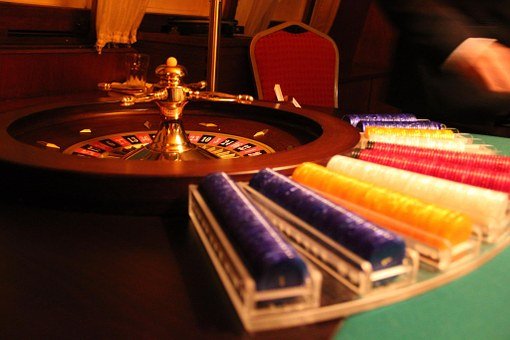If you said any number other than .50 (or 50%) you just fell victim to the Gambler's Fallacy... Don't worry you are not alone, many people fall victim to this line of thinking.
What is the Gambler's Fallacy you may ask?
The Gambler's Fallacy is defined as:
The mistaken belief that if something happens more frequently than normal during some period, it will happen less frequently in the future. And inversely, if something happens less frequently than normal during some period, it will happen more frequently in the future (presumably as a means of balancing nature). (Wikipedia)
Basically it is where people see certain events happen a bunch of times in a row so they tend to take the opposite side thinking that since such an event has happened so many times already the opposite outcome is "due". That line of thinking has lost people many a dollar at the roulette table...
In fact the Gambler's Falacy also goes by another name because of a famous incident that occurred involving a roulette table at a casino... "The Monte Carlo Fallacy".

Back on August 18, 1913, there occurred one of the most famous examples of the gamblers fallacy ever recorded. At the Monte Carlo Casino, the ball had fallen black 26 times in a row at the roulette table. This was an extremely uncommon occurrence and upon hearing this, gamblers flocked to the game betting massive amounts of money on "red" thinking, incorrectly, that since "black" had come up so many times in a row, "red" was due to come up any time. Needless to say millions of dollars (actually francs) were lost that day as there is no imbalance in nature that must be corrected no matter how many times the ball lands on "black".
Each event is independent of every other event. The wheel and ball don't know that they landed on "black" the previous spin and therefore there is no imbalance that must be correct... there is no history that can influence future outcomes.
Now what if I told you I flipped a coin 50 times and it came up with heads 50 times in a row... what would you say the probability is of that next coin flip also coming up heads?

This is where it gets a little tricky... if we can determine that each coin toss really is a mutually exclusive and independent event we could safely say that there is a 50% probability that the next flip will also be heads. However, when we have a long list like this one has to wonder if maybe these events are not equally likely... one has to wonder if perhaps the person flipping the coin has some kind of skill where they can reliably make a coin land on heads... this would be a case where the probability is unknown.
When the probability is unknown we can safely assume, using the Bayesian Inference, that the previous outcomes demonstrate the likely direction of the bias and the outcome that has occurred the most in the observed data is most likely to continue in the future.
In our instance... heads.
What is the Bayesian Inference?
The Bayesian Inference is where the probability of an outcome is constantly updated as more evidence or information becomes available. It is an important technique in statistics, and especially mathematical statistics. In our coin toss example, the more times a coin lands on heads the more data and information we have collected. Thus we can safely assume that the coin toss is not an independent event. Either it is not a "fair coin" or there is some skill on the part of the person tossing the coin or some other outside force that is making the outcomes not equally likely.

Therefore when deciding what the probability is of a certain event, the first thing we must do and be certain of is that the event truly is an independent event with both outcomes being equal. If they are not, then we must use the Bayesian inference and draw our conclusions from the data available.
In the case of the roulette table... had this principle been followed, people would have bet on "black" instead of "red" and continued to make large amounts of money as "black" continued to come up.
Live well my friends!
Sources:
https://en.wikipedia.org/wiki/Gambler%27s_fallacy
Image Sources:
All images are courtesy of Pixabay.com
Follow: @jrcornel
Awesome post. This is the only way I will play roulette. I pick my color ahead of time and wait for it to come up then bet on it to come up again. I'm betting on the natural occurrence of streaks.
Followed!
Downvoting a post can decrease pending rewards and make it less visible. Common reasons:
Submit
Haha well if it works, for you go with it! Me personally... I just play black jack ;)
Downvoting a post can decrease pending rewards and make it less visible. Common reasons:
Submit
Well I only play roulette if I'm drunk and just having fun with friends. I'm pretty much expecting to lose at that game.
BJ is my true love. Poker can be fun too.
Downvoting a post can decrease pending rewards and make it less visible. Common reasons:
Submit
Thanks for the run-down. The Gambler's Fallacy trips us up so often because our brains are wired up to spot patterns and regularities. One of my amateur's conceits about anthropology concerns the mystic throwing-the-bones rituals: to the extent that the bone-throwing or augur generated a random outcome, the tribe or group using it got the benefit of the Gambler's Fallacy working for them. If your next path is random, you're unpredictable!
Downvoting a post can decrease pending rewards and make it less visible. Common reasons:
Submit
Haha precisely! Thanks for sharing :)
Downvoting a post can decrease pending rewards and make it less visible. Common reasons:
Submit
It depends on what you mean. The probability of getting 4 heads in a row from the point you start is 0.0625 but the probability at each point when you flip the coin of the next result being a head will remain at 0.5 assuming fairness - they are different probabilities.
Downvoting a post can decrease pending rewards and make it less visible. Common reasons:
Submit
Yep! You would be surprised how many times people don't catch that... our brains seem to be wired to think everything reverts back to a statistical norm... even in the short run...
Downvoting a post can decrease pending rewards and make it less visible. Common reasons:
Submit
I think it is part of believing in their being some kind of consciousness behind the scenes watching the universe to make sure that everything works just right:)
Downvoting a post can decrease pending rewards and make it less visible. Common reasons:
Submit
Could be! Kind of along the lines of Karma... this ball has screwed me 10 times in a row... now it has to bounce in my favor after all of the screwing! :)
Downvoting a post can decrease pending rewards and make it less visible. Common reasons:
Submit
Very cool! Thanks for sharing! Statistics is very important, also in fundamental physics where all phenomena are statistical (thanks to quantum mechanics).
I btw recommend the reading of old posts (a month ago) by @krishtopa on probabilities that nicely complement yours!
Downvoting a post can decrease pending rewards and make it less visible. Common reasons:
Submit
Thanks, I'll take a look!
Downvoting a post can decrease pending rewards and make it less visible. Common reasons:
Submit
I bet on tails!
Downvoting a post can decrease pending rewards and make it less visible. Common reasons:
Submit
Haha well you have a 50/50 chance ;)
Downvoting a post can decrease pending rewards and make it less visible. Common reasons:
Submit
Actually it is not exactly 50/50. Tails will come up more often. This may be very slight and may only become more of a factor in the right conditions.
And if the coin is being flipped by a human I bet on the face of the coin that is face up before the flip.
Downvoting a post can decrease pending rewards and make it less visible. Common reasons:
Submit
Really? Can you elaborate on why tails would come up more often?
Downvoting a post can decrease pending rewards and make it less visible. Common reasons:
Submit
There is a difference in weight and overall smoothness between the two sides. The head side weighing more with its different overall curvature.
This can be best demonstrated by spinning a penny on a table.
The effect is greatly diminished by flipping a coin through the air to a very small percentage.
Downvoting a post can decrease pending rewards and make it less visible. Common reasons:
Submit
Interesting, thanks for sharing! I did not know that...
Downvoting a post can decrease pending rewards and make it less visible. Common reasons:
Submit
If you don't have a coin on your hands, you flip a coin online https://flipsacoin.net/
Downvoting a post can decrease pending rewards and make it less visible. Common reasons:
Submit